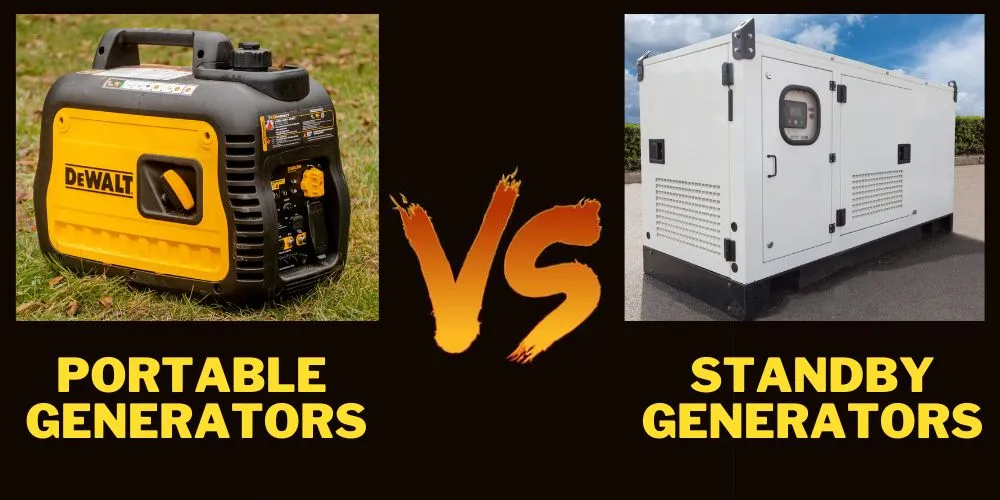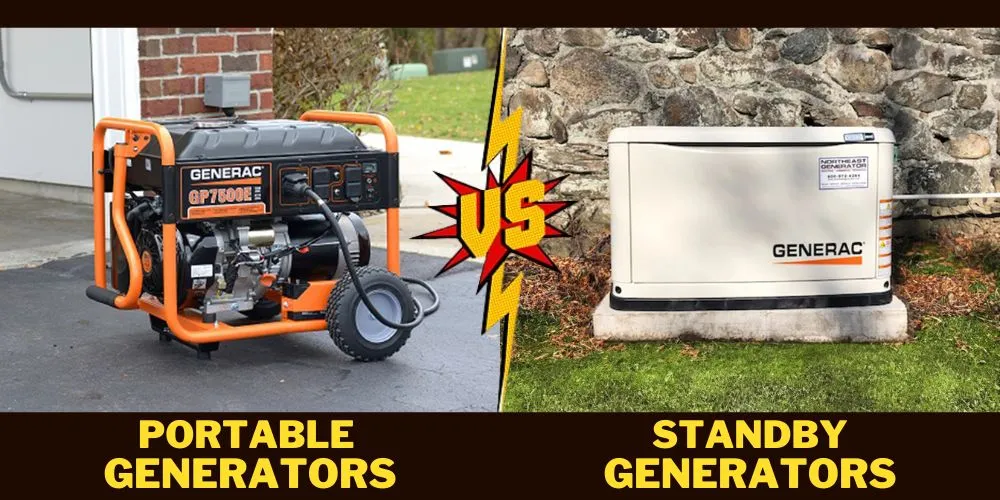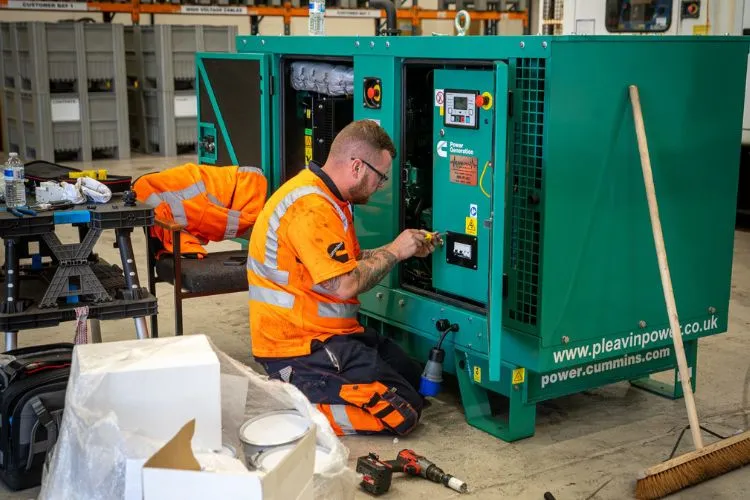In an era where power outages have become more frequent due to unpredictable weather conditions and grid failures, having a backup power solution is not just a luxury but a necessity.
Among the myriad options available, portable and standby generators stand out as popular choices, each possessing unique features that cater to diverse needs.
This Portable vs Standby Generators comprehensive comparison aims to shed light on both types, helping homeowners make an informed decision on which generator suits their situation best.

What is a Portable Generator?
Portable generators are compact, moveable units that supply electricity in emergency situations or in areas where the grid is inaccessible. Typically powered by gasoline, diesel, or propane, these generators are known for their versatility and ease of use.
However, their convenience comes with limitations. Portable generators often have lower power output compared to their standby counterparts, making them suitable for temporary solutions rather than whole-house power backup.
One of the biggest advantages of a portable generator is its flexibility. You can easily move it to different locations, making it ideal for outdoor events, camping, or job sites.
On the downside, they require manual setup and operation in case of a power outage, including refuelling, which can be a drawback during extended blackouts.
You may also like to know: How Much Space Does a Portable Generator Need?
What is a Standby Generator?
Standby generators, on the other hand, are permanent installations that automatically provide power during an outage. Running on natural gas or propane, they are directly connected to the electrical system of a house, offering a seamless transition when the main power source fails.
Standby generators are designed to handle higher power loads, capable of powering an entire home, including heating and cooling systems, appliances, and critical electronics.
The automatic operation of standby generators means there is no need to brave inclement weather to start the unit, and there is no hassle of refueling, as they are connected to your home’s natural gas or propane supply.
The major drawbacks include higher initial costs for purchase and installation, and they require a dedicated space outside your home.
Portable vs Standby Generators: Key Differences
Standby generators have a higher power output, which is essential for running a home’s critical systems and most appliances simultaneously. Portable generators are more suited for powering a few essential items at a time.

Installation and Maintenance: Standby generators require professional installation and regular maintenance by a technician. Portable generators are relatively low-maintenance, and setup is straightforward, requiring you to just plug in the appliances or extension cords.
Cost Implications: Initially, standby generators are more expensive, considering the unit’s cost and installation fees. However, they add value to your property and offer convenience and peace of mind. Portable generators are more budget-friendly but offer limited power and require manual operation during an outage.
Reliability and Safety: Standby generators are generally more reliable, with the ability to run for extended periods, and include safety features that protect the home’s electrical system. Portable generators, if not used properly, can pose safety risks, including carbon monoxide poisoning if not operated in well-ventilated areas.
Fuel Efficiency
Fuel efficiency is a vital component to consider when making your generator choice. Standby generators are generally more fuel-efficient as they’re designed to operate for extended periods.
They’re directly connected to a home’s natural gas or propane line, negating the need for refueling. These generators continually adjust the fuel consumption rate to generate only the electricity you need, minimizing wastage.
However, the efficiency of portable generators can significantly vary, typically being less fuel-efficient than their standby counterparts. They run on gasoline, diesel, or propane and may need frequent refueling, especially during extended power outages.
You may also find useful: Can You Use Portable Generator Indoors?
Noise Levels
Generators, like any machine, generate noise when operating. On average, a portable generator’s noise level falls between 65 to 75 decibels (dB) at 23 ft away, equivalent to the loudness of a vacuum cleaner or a crowded restaurant.
Certain models may be even noisier. Therefore, if noise is a concern, it’s deemed crucial to invest in a quiet portable generator or install it far enough away from living spaces to minimize disturbance.
In contrast, standby generators are usually quieter, with noise levels ranging from 60 to 70 dB at 23 ft away. The lower noise generation is due to their permanent housing, which usually has built-in noise reduction features like soundproofing insulation.
Lifespan and Warranty
Standby generators’ lifespans generally surpass portable generators due to their build quality. A well-maintained standby generator can last 20 to 30 years. Generally, manufacturers cover these generators with warranties that last from 2 years to 5 years, some with an option to extend.
Portable generators, on the other hand, endure less usage, enabling them to last quite long despite their smaller build. A portable generator can last approximately 10 to 20 years with proper maintenance. Their warranties typically run for 1 to 3 years.
Environmental Impact
When considering environmental impacts, standby generators usually have an advantage. Standby generators’ higher fuel efficiency and connection to natural gas or propane lines significantly reduce their greenhouse gas emissions, making them a greener choice.
Portable generators, while being less eco-friendly due to their lower fuel efficiency, can still be a good option if used sparingly and properly maintained to minimize emissions. Also, options for biodiesel or hybrid models that integrate with solar panels may reduce the environmental impact.
While both types of generators contribute to emissions, considering eco-friendly models, improving fuel efficiency, and performing regular maintenance can minimize their environmental footprint. Before making a purchase, researching the best practices and technologies can help you make a more informed, eco-conscious decision.
How to Choose the Right Generator for Your Home
Selecting between a portable and standby generator boils down to assessing your power needs, budget, and desired level of convenience. Start by listing the essentials you need powered during an outage and calculate the total wattage required.
Consider the long-term costs, including fuel and maintenance, and weigh them against the initial investment and the convenience factor.
Moreover, think about the installation space available and local regulations concerning generator usage, as some areas have strict guidelines for noise levels and fuel storage.
Regardless of the choice, both generators present a viable solution for power outages, significantly differing in their operation, maintenance, and upfront costs.
Pro Tips
When operating a portable generator, always prioritize safety by keeping it in a well-ventilated area away from windows and doors to prevent carbon monoxide poisoning.
For standby generators, regular maintenance checks by a professional can prolong the unit’s life and ensure it performs optimally when needed most.

Understanding the nuances between portable and standby generators marks the first step towards making an informed decision.
By considering the critical differences and assessing your specific needs, you can select the right generator that provides peace of mind and security, knowing your home is prepared for whatever power challenges it may face in the future.
Conclusion:
In the battle of portable vs. standby generators, the best choice is ultimately dependent on an individual’s specific needs and circumstances. Standby generators offer unparalleled convenience and power capacity for those seeking a comprehensive solution to frequent or prolonged outages.
Portable generators, being budget-friendly and versatile, serve as an excellent option for temporary power needs or for individuals on the move. As with any significant investment, careful consideration of your requirements will guide you to the ideal backup power source for your home, ensuring that you remain powered up during critical times.
